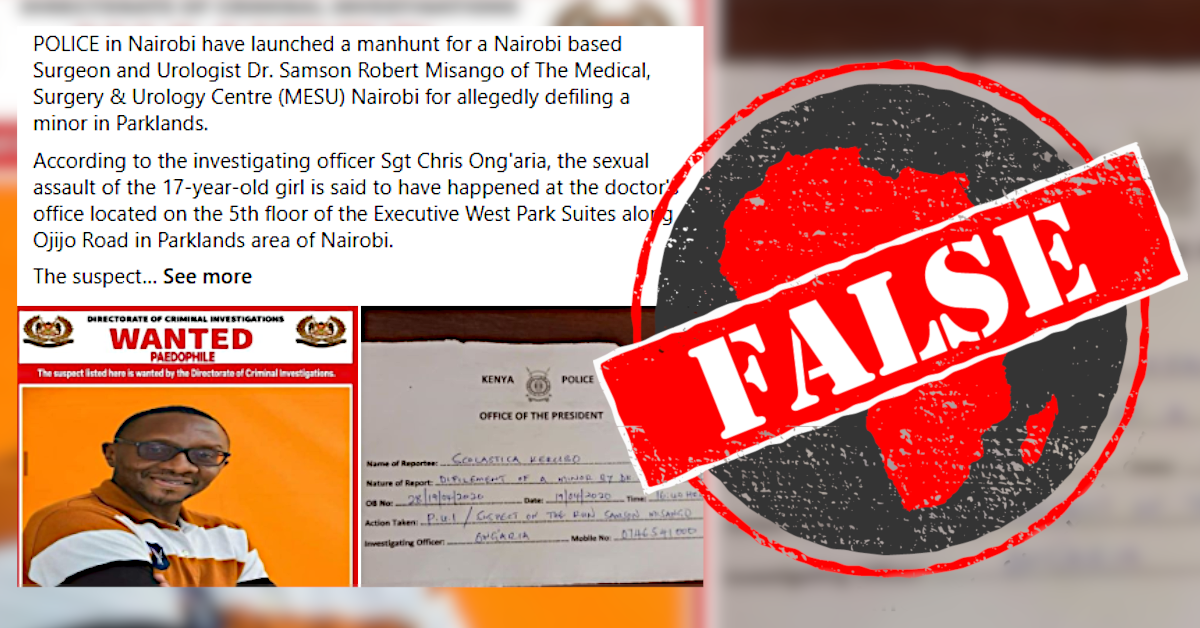A lengthy Facebook post from 25 April 2020 claims Kenyan police have “launched a manhunt” for a “Surgeon and Urologist” for sexually assaulting a 17-year-old girl at his office “in the Parklands area of Nairobi”.
It shows what looks like a poster issued by the Directorate of Criminal Investigations (DCI), headed “WANTED PAEDOPHILE”. A photo of the doctor, and his name, appears on the poster.
The post also includes a photo of what seems to be a complaint filed by the supposed victim’s mother, dated 19 April. The occurrence book, or OB, number is 28/19/04/2020.
But the Facebook post is false.

A day after the post appeared, the DCI said it would be investigating its source.
The directorate tweeted the “wanted” poster and the occurrence book document, saying it wished “to notify members of the public that information circulating on social media of a wanted suspect as captioned on the attached image is not from us”.
It said DCI detectives “are investigating the Source & Motive of the said information”.
In a follow-up tweet, the DCI said the sheet from the occurrence book was not genuine. “A sheet of OB extract allegedly issued at Parklands Police Station bears information not captured in the Occurrence Book as per the said OB number.” The name of the officer on the complaint “is unknown to the Officer Commanding Station”.
It added: “Legal measures to be taken against the perpetrator(s).”
The doctor told our fact-checking colleagues at PesaCheck that he “suspects that he is being attacked because he is very opinionated and posts strong medical and social views on his Facebook account”. – Grace Gichuhi
It shows what looks like a poster issued by the Directorate of Criminal Investigations (DCI), headed “WANTED PAEDOPHILE”. A photo of the doctor, and his name, appears on the poster.
The post also includes a photo of what seems to be a complaint filed by the supposed victim’s mother, dated 19 April. The occurrence book, or OB, number is 28/19/04/2020.
But the Facebook post is false.

Poster, complaint ‘not from us’
A day after the post appeared, the DCI said it would be investigating its source.
The directorate tweeted the “wanted” poster and the occurrence book document, saying it wished “to notify members of the public that information circulating on social media of a wanted suspect as captioned on the attached image is not from us”.
It said DCI detectives “are investigating the Source & Motive of the said information”.
In a follow-up tweet, the DCI said the sheet from the occurrence book was not genuine. “A sheet of OB extract allegedly issued at Parklands Police Station bears information not captured in the Occurrence Book as per the said OB number.” The name of the officer on the complaint “is unknown to the Officer Commanding Station”.
It added: “Legal measures to be taken against the perpetrator(s).”
The doctor told our fact-checking colleagues at PesaCheck that he “suspects that he is being attacked because he is very opinionated and posts strong medical and social views on his Facebook account”. – Grace Gichuhi
Republish our content for free
For publishers: what to do if your post is rated false
A fact-checker has rated your Facebook or Instagram post as “false”, “altered”, “partly false” or “missing context”. This could have serious consequences. What do you do?
Click on our guide for the steps you should follow.
Publishers guideAfrica Check teams up with Facebook
Africa Check is a partner in Meta's third-party fact-checking programme to help stop the spread of false information on social media.
The content we rate as “false” will be downgraded on Facebook and Instagram. This means fewer people will see it.
You can also help identify false information on Facebook. This guide explains how.


Add new comment